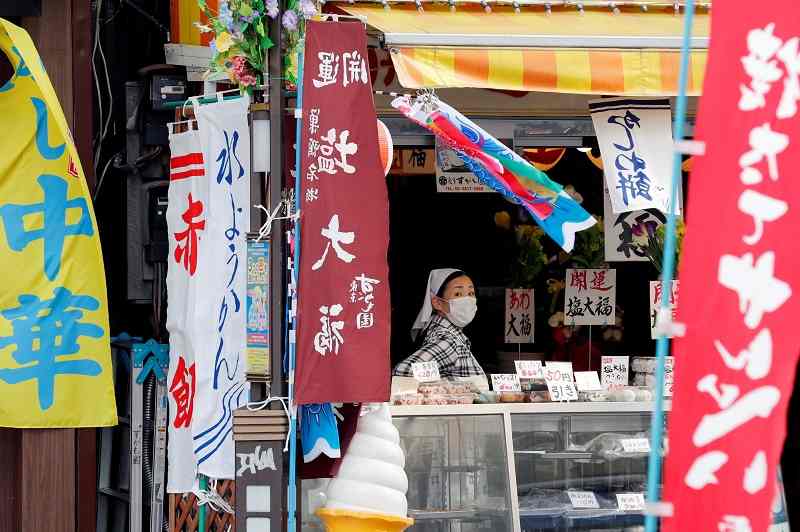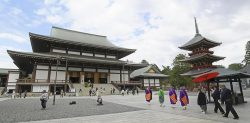
FILE PHOTO: A woman wearing protective mask waits for customers at a market district in Tokyo, Japan May 13, 2020.
11:26 JST, May 10, 2022
TOKYO (Reuters) – Japan’s household spending fell in March for the first time in three months, though the 2.3% drop was smaller than expected, as consumers remained cautious despite some easing of COVID-19 curbs.
While lower coronavirus risks have boosted consumer activity since April, rising living costs may cramp Japan’s consumption-led recovery for the rest of 2022, analysts say. Inflation is at a multi-year-high in the world’s third-biggest economy, fanned by war in Ukraine and the yen’s skid to 20-year-lows.
Government data on Tuesday confirmed the March spending drop versus the same month a year earlier. The decrease was narrower than Reuters’ median market estimate for a 2.8% drop, and followed 1.1% growth in February.
The first fall since December was also partly due to a tough comparison with March 2021, when spending surged 6.5%, a government official told a media briefing. Some items like mobile devices, cars and takeaway foods saw robust demand, the official said.
Service spending on dining and travel agencies also slightly increased year-on-year, he said.
Meanwhile, spending on fresh foods and home appliances decreased from a year earlier, and consumption still remained below pre-pandemic levels in March, according to the data.
Household spending in the January-March quarter was down 1.8% from the previous quarter, the data showed, as curbs to combat the Omicron COVID variant lasted until late March.
“Japan has constantly lagged behind other countries in economic reopening, where consumption is still hugely swayed by infection trends and hindered from recovering further,” said Takeshi Minami, chief economist at Norinchukin Research Institute.
On a seasonally-adjusted, month-on-month basis, spending rose 4.1% in March, which was the first rise in three months and stronger than the forecast 2.6% growth.
“So-called ‘revenge spending’ on previously restricted areas likely covered the dip from consumer price hikes,” said Minami, referring to households jumping on early opportunities to spend after the lifting of COVID curbs on in-person services.
“However, as energy costs such as electricity bills as well as food prices have been rising, the upcoming rebound in consumption might end up not as strong as expected,” he said.
With households facing bigger bills, in March, Japanese real wages fell for the first time in three months as inflation outstripped steady nominal wage growth.
Economists expect the world’s third-largest economy to have contracted an annualized 0.7% in the January-March, followed by a 5.1% rebound in April-June, according to the latest Reuters poll.
Top Articles in News Services
-

Survey Shows False Election Info Perceived as True
-

Hong Kong Ex-Publisher Jimmy Lai’s Sentence Raises International Outcry as China Defends It
-

Japan’s Nikkei Stock Average Falls as US-Iran Tensions Unsettle Investors (UPDATE 1)
-

Japan’s Nikkei Stock Average Touches 58,000 as Yen, Jgbs Rally on Election Fallout (UPDATE 1)
-

Japan’s Nikkei Stock Average Rises on Tech Rally and Takaichi’s Spending Hopes (UPDATE 1)
JN ACCESS RANKING
-

Producer Behind Pop Group XG Arrested for Cocaine Possession
-

Japan PM Takaichi’s Cabinet Resigns en Masse
-

Man Infected with Measles Reportedly Dined at Restaurant in Tokyo Station
-

Israeli Ambassador to Japan Speaks about Japan’s Role in the Reconstruction of Gaza
-

Videos Plagiarized, Reposted with False Subtitles Claiming ‘Ryukyu Belongs to China’; Anti-China False Information Also Posted in Japan























